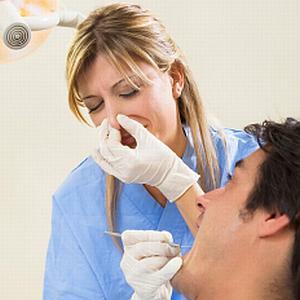
Halitosis.
What are the most common causes of bad breath?
- An overgrowth of bacteria in the mouth cavity resulting from inadequate tongue cleaning
- Poor oral hygiene
- Gum disease/gums that bleed when you brush or floss
- Unclean dentures
- Oral abscesses
- Post nasal drip, colds, flu and other illnesses
- Dry mouth caused by mouth breathing, fasting, prolonged talking, stress and some medications
- Tobacco smoking
We were always led to believe that bad breath was related to the stomach. Is this not the case?
Most sufferers of halitosis and most doctors/dentists still believe that the origin of halitosis is the stomach and colon area. Many patients therefore initially seek help from gastroenterologists. But science today has proven otherwise.
Isn’t "tongue cleaning" taking oral hygiene a bit too far?
No, not at all. When one considers the effort that goes into the upkeep of healthy teeth and gums and into the cleanliness routines of hair, it is incredible that we continue to disregard the tongue. Somehow oral care from an early age has not focused on tongue cleaning and as a result the tongueis often forgotten.
Is "tongue cleaning" a new trend?
No, in fact details of tongue cleaning from centuries ago have been written in Indian and Chinese scripts. The Chinese make reference from 1927 "… with it you use the tongue scraper, a 10cm long and 7mm wide metal strip that had to be carried around attached to their buttonhole…"
What happens when the tongue is not cleaned?
The top layer of the tongue offers the perfect breeding ground for bacteria. A coating of bacteria formsthat doctors and scientists believe has a damaging effect on general health with the most common effect being bad breath. The thicker this layer becomes, the stronger the odour.
How does tongue cleaning prevent bad breath?
Daily cleaning of the tongue prevents increased coatings of bacteria forming. The back of the tongue is multilayered, consisting of stringy, leaf-like capillaries, which form a nesting place for bacteria. About two thirds of all bacteria in the oral cavity is attached to the tongue.
How is bad breath formed?
A Gram-negative bacteria coating develops on the tongue and gums. This consists of blood and saliva components, food particles, skin cells and micro-organisms. Within hours of brushing teeth, new saliva forms compounds such as amine and sulphur also known as VSC (volatile sulphur compounds). VSC emits an odour that is particularly noticeable and easily identified. Known as methylmercaptan, the compound is 100 times more intense to the human nose than sulphur hydrogen.
Is bad breath a common problem?
Yes it is. Approximately 20% of the adult European population suffers from this condition.
What is the most common cause of the large majority of halitosis cases?
Medical studies show that more that 80% of halitosis cases originate from the inside of the mouth, specifically the surface of the tongue.
What is the medical profession doing to help people with this condition?
- Initiating and increasing consumer awareness and education in popular magazines
- Developing products specifically designed to combat this problem
- Dentists are starting to offer halitosis therapy to patients
- Medical conferences the world over are urging dentists and dental assistants, to take tongue care into consideration while consulting and treating patients.
What self-tests can be done to check the status of one’s breath?
- Stick your tongue out as far as you can. Then lick your upper arm or the inner surface of your wrist, wait 4 seconds and smell where you licked.
- Or place a piece of gauzy cloth on your tongue; as far back as you can, for a few moments. Take it out, let it dry and then sniff it.
How can bad breath be prevented?
- Brush the tongue every time the teeth are brushed - twice daily.
- Invest in a tooth and tongue brush
- Use a toothpaste that actively foams and is able to reach all the nooks and crannies in the oral cavity.
- Visit an oral hygienist for an “in-the-chair clean” every six months.




 Publications
Publications
 Partners
Partners















